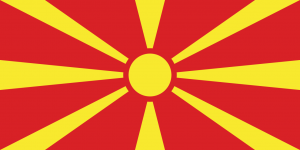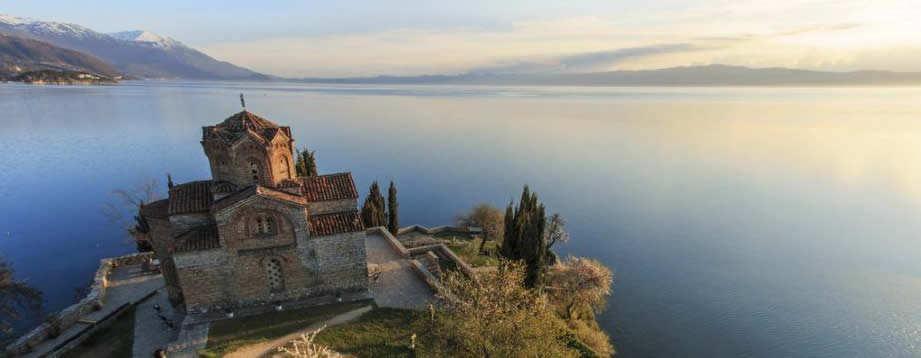Language/Macedonian/Culture/North-Macedonia-Timeline
< Language | Macedonian | Culture
Jump to navigation
Jump to search
Rate this lesson:
Historical Timeline for North Macedonia - A chronology of key events
North Macedonia Timeline[edit | edit source]
| Date | Event |
|---|---|
| 2500-2000 BC AD | Indo-European peoples, in particular the Illyrians, ancestors of the Albanians, came to settle on the territory of the present Republic of Macedonia. |
| 360 BC AD | King Macedonia Philippe II strengthens his kingdom (north of what is now Greece) and leads a raid in what is now the Republic of Macedonia. |
| 168 BC AD | Roman Peace. In the region, the Romans modernized the towns of Stobi, Heraclea Linkestis and Skupi. |
| 395 | Division of the Roman Empire. The territory of the current Republic of Macedonia was then part of the Eastern Empire. |
| 6th-7th centuries | The Avars, the Serbian Slavs and Bulgarian Slavo-Turks settled in the region. |
| 886 | The Bulgarian emperor Boris I and Saint Clement of Ohrid founded the literary school of Ohrid which became the main intellectual and religious center of the Slavs for two centuries. |
| 976-1014 | The Bulgarian emperor Samuel I expands his territory and installs his capital in Ohrid. |
| 1018 | Return of the Byzantines for two centuries. |
| 14th century | Serbian domination. |
| 1395 | Beginning of the Ottoman period. |
| 1689 | Bulgarian uprising against the Ottomans organized by Petar Karpoš. |
| September 12, 1829 | Independence of Greece. Beginning of the awakening of nationalism in the Balkans. |
| March 3, 1878 | Independence of Bulgaria which integrates the current territory of the Republic of Macedonia. |
| July 13, 1878 | The Treaty of Berlin returns to the line of the frontiers of Bulgaria. Geographical Macedonia is returned to the Ottoman Empire. |
| October 23, 1893 | Foundation of the Macedonian-Andrinopolitan Interior Revolutionary Organization for the liberation of the Bulgarian-speaking territories still under Ottoman domination. |
| 1903 | In the Bulgarian-speaking regions still controlled by the Ottoman Empire, the Ilinden insurrection breaks out. Creation of an ephemeral republic for 10 days in Kruševo. |
| November 28, 1912 | Independence of Albania. |
| 1912-1913 | Second Balkan War. Geographic Macedonia is divided between Greece, Bulgaria and Serbia. |
| 1914-1918 | First World War. The French army in the East and its allies are fighting on the Macedonian front against the Bulgarians, the Germans and the Austro-Hungarians. |
| 1918-1941 | Macedonia known as "Vardar" is integrated into the new kingdom of the Serbs, Croats and Slovenes, renamed kingdom of Yugoslavia in 1929. Policy of "serbization" of the Bulgarian-speaking populations. |
| October 9, 1934 | Marseilles attack: during an official visit to France, the King of Yugoslavia is assassinated by a probulgare activist from Macedonian Vardar. |
| 1941-1945 | Second World War in the Balkans. Vardar Macedonia is divided between Bulgaria and Albania, pro-German. Policy of "re-bulgarization". Massive deportations of Jewish populations. |
| August 2, 1944 | Creation by the partisans of Tito of the Socialist Republic of Macedonia, still occupied by the Germans, Bulgarians and Albanians. |
| November 19, 1944 | Liberation of Skopje by the partisans of Tito and the Bulgarian troops passed in the allied camp. |
| July 1945 | End of resistance by pro-fascist Albanian troops in Kosovo and the Tetovo region. |
| November 29, 1945 | Creation of the Socialist Federal Republic of Yugoslavia with six federal entities including the Socialist Republic of Macedonia. |
| July 26, 1963 | Earthquake in Skopje: 1,000 dead, 3,000 injured and 120,000 homeless. |
| May 4, 1980 | Tito's death opens political disputes in the Yugoslav Federation. |
| September 8, 1991 | The Republic of Macedonia becomes independent. |
| February 16, 1994 | Beginning of the blockade of the Republic of Macedonia by Greece over the name of the country and the flag chosen which is a loan from Hellenic culture. |
| September 15, 1995 | The Republic agrees to change its flag. The Greek blockade is lifted. |
| 1998-1999 | Kosovo War. Thousands of Kosovar Albanian refugees are flocking to the Republic of Macedonia. |
| January-August 2001 | Civil war in the Republic of Macedonia, the Albanian separatists rise up. In August, NATO, the UN and the EU intervene. In the same month, the Ohrid accords were signed, giving more rights to Albanians and certain minorities. |
| January 2002 | First census taking ethnic groups into account. |
| 2005 | Greece blocks the entry of the Republic of Macedonia into NATO. However, the European Council recognizes the status of the Republic of Macedonia as a candidate for EU membership. |
| August 2006 | Victory for the nationalists of the VMRO-DPMNE in the legislative elections, Nikola Gruevski becomes Prime Minister. |
| November 2009 | The inhabitants of the country no longer need a visa to enter the Schengen area. |
| November-December 2010 | Negotiations with Greece on the “name” issue. Athens makes a concession by accepting "Republic of North Macedonia". Prime Minister Gruevski refuses. |
| April-July 2011 | Population census canceled for irregularities. |
| 2012-2013 | Political crisis. The EU acts as a mediator. |
| April 2014 | Early legislative elections: victory for the nationalists of the VMRO-DPMNE, Nikola Gruevski remains Prime Minister. |
| 2015 | Political crisis: Nikola Gruevski is prosecuted for abuse of power, corruption and wiretapping, but he remains in power. Violent demonstrations. The EU acts as a mediator. |
| May 9-10, 2015 | KLA attack in Kumanovo: 18 dead, 65 wounded. |
| January 18, 2016 | Nikola Gruevski resigns after having been Prime Minister for ten years. But the VMRO-DPMNE retains the power. |
| August 2016 | Floods: 22 dead in Skopje and Tetovo. |
| December 2016 | Legislative elections: the VMRO-DPMNE comes slightly ahead. The institutional crisis continues. |
| April 2017 | NATO puts pressure on Skopje and Athens to find a solution on the “name” issue. |
| April-May 2017 | Change of majority: the Democrats of the SDSM manage to form a coalition with two small Albanian parties. Zoran Zaev becomes Prime Minister. Resumption of negotiations with Greece and Bulgaria. |
| August 1, 2017 | Historic agreement with Bulgaria: after eighteen years of negotiations, Skopje undertakes to "objectively re-examine the common history of the two countries" and to recognize the existence of a "Bulgarian ethnicity" on his territory. For her part, Sofia p |
| February 8, 2018 | As a sign of appeasement with Greece, Alexander the Great Airport is renamed "Skopje International Airport". |
| June 17, 2018 | Historic agreement with Greece, known as the "Prespa agreement": after twenty-seven years of negotiations, Skopje and Athens agree on the question of the "name". It will be "Republic of North Macedonia". |
| September 30, 2018 | Referendum on the new name of the country: the "yes" wins (91%), but the ballot is invalidated due to the low turnout (37%). |
| October 18, 2018 | Beginning of official negotiations for the country's accession to NATO. |
| October 19, 2018 | Zoran Zaev manages to gather a two-thirds majority in the Assembly to amend the Constitution and change the name of the country. But the President of the Republic Gjorge Ivanov (VMRO-DPMNE), supported by Russia, announces that he wants to block the proces |
| November 1, 2018 | Air links between Athens and Skopje resume after twelve years of interruption. |
| November 12, 2018 | Sentenced to two years in prison for abuse of power and prosecuted in other cases, former Prime Minister Nikola Gruevski takes refuge in Hungary. |


